What is epoxy flooring and why is it becoming more popular?

March 25th, 2022
What is Epoxy Flooring?
Epoxy flooring refers to a floor that has been coated with a protective layer of epoxy. This layer is made out of polymer resins and hardeners which are mixed together before their application. Epoxy paints are tough, durable and highly stain resistant.
There are three different bases for epoxy paints: water, solvent, and solid epoxy. Solvent based epoxy paint is stronger and better at protecting the floor, but there is a risk of harmful fumes from the chemicals used.
Water based epoxy paint is less effective, but there is no toxin risk. Solid epoxy is expensive and should never be attempted by a DIYer as it hardens incredibly quickly, making it a material only suitable for professional installation. Solid epoxy is the purest form of epoxy and contains no mixed solutions.

Epoxy paint is most commonly used for flooring in situations with a high level of traffic. Due to its durability, epoxy paint is perfect for application in garages, basements and warehouses.
Epoxy is also becoming more popular in kitchens to protect the floor from food spillage/staining, and in bathrooms as it has anti-slip benefits. Epoxy floors can also become a design feature of the room as there are customisable options of pre-tinted and metalic epoxy floors – or you can even select an epoxy paint that mimics the look of traditional marble.

Epoxy flooring is extremely durable, making it a popular choice for workspaces and industrial settings. It is nonflammable and can withstand high traffic, chemical spills, and force damage. Epoxy flooring is also shock resistant and can last for as long as 20 years when correctly installed.
There are some concerns with epoxy flooring – most prominantly, solvent based epoxy floor paint. However, modern epoxy flooring is very safe. The only danger that comes with epoxy is during installation or if it is incorrectly applied.
This is what makes epoxy flooring a poor choice for a ‘do it yourself’ project, as it will be extremely time consuming, dangerous, and likely expensive. During the installation of epoxy, the installer must wear a respirator to apply the finish. The area will need to be well ventilated and empty of people/pets (keep at a safe distace from the room overall).
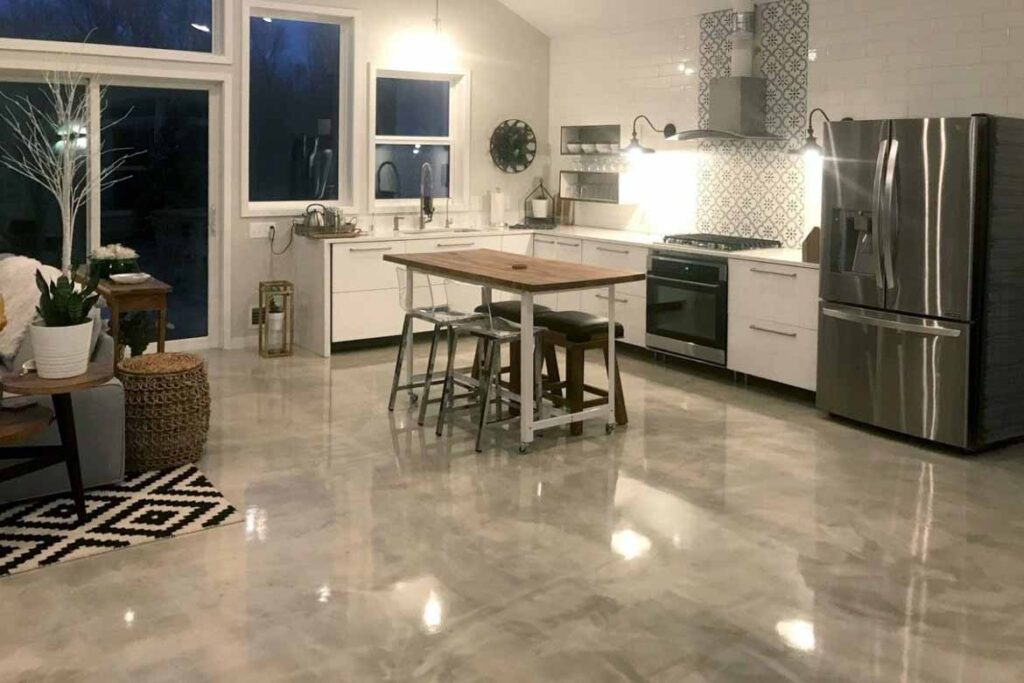
How much standard quality epoxy floor coating will cost is usually around $30-$35 per sqm all up for the two necessary coats. If you plan to install epoxy over existing concrete, the cost of diamond grinding will raise the overall epoxy installation cost to $80-$100. The price and necessity of grining the floor beforehand will depend on the conditions of the surface and particularly how smooth/clean it is.

Realistically, epoxy flooring is a challenging DIY project and should not be attempted by an inexperienced DIY-er. The chances of making a mistake and exposing yourself to harmful chemicals, or incorrectly installing the floor and causing further issues in time are high.
However, if you are experienced and confident in your abilities, you may wish to purchase an epoxy flooring kit from Bunnings. You will definitely need respirators for the installation to protect yourself from the fumes, as well as other PPE such as gloves and long sleves. Other equipment likely to be necessary for an epoxy installation includes heavy duty cleaning instruments for preparing the floor and a variety of painting equipment for the actual epoxy paint application.
07. Natural Stone Epoxy Flooring

Natural stone is already one of the most durable flooring materials. Adding an extra layer of protection by applying epoxy to your natural stone floors is a surefire way to keep your floor pristine for many years to come.

Epoxy flooring can give your natural stone floor a glossy shine, or if preferred you can request a matte finish instead. The most common type of natural stone floor to have epoxy paint is pebble or granite, though all types of natural stone are suitable for an epoxy finish.
06. Terrazzo Epoxy Flooring

Epoxy terrazzo is a widely popular form of epoxy flooring due to its ability to imitate other flooring styles. This product contains flake epoxy which create texture and reflect light, resulting in a finish that can mimic high quality flooring options such as marble or quartz.

However, it is an expensive choice and has an extremely difficult installation process, making it an imperfect choice for the budget-conscious DIY-er.
05. Industrial Epoxy Flooring

Epoxy flooring has become more popular throughout recent years in industrial and residential contexts, beginning to challenge even polished concrete.

Epoxy flooring is mostly used for commercial settings such as offices, clinics and laboratories (while polished concrete remains fairly popular for retail stores, restaurants and hotels). This is in part due to the superior chemical resistance held by epoxy flooring.
04. Epoxy Marble Flooring

One of the main draws of epoxy flooring is its ability to mimic other flooring styles at a reduced price. Of these styles, marble is certainly one of the most beautiful.
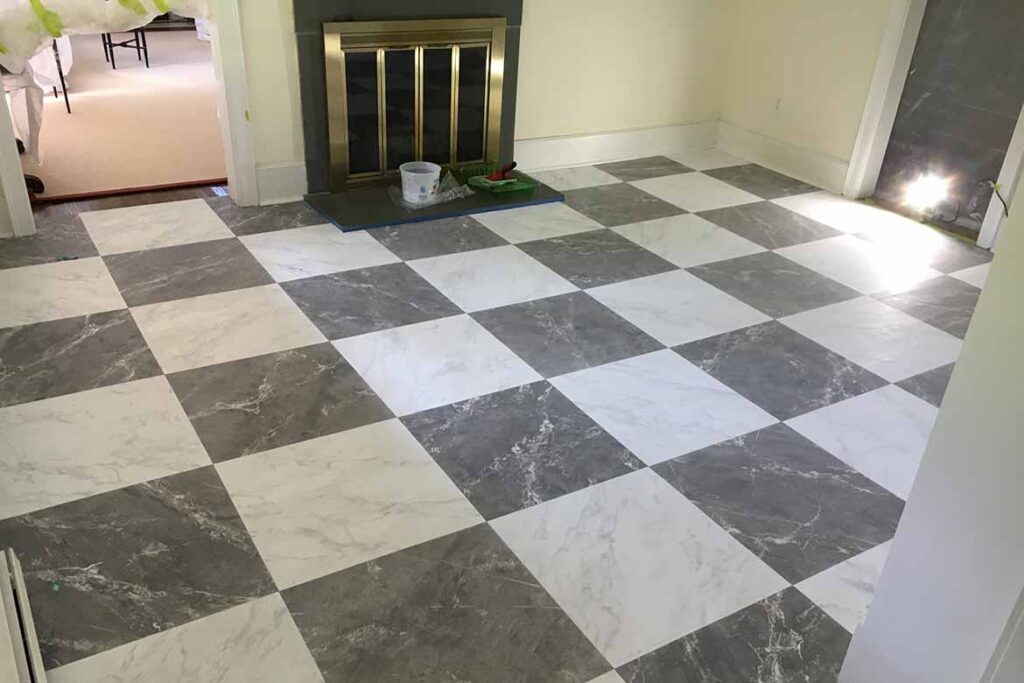
Marble flooring is a luxurious choice and has had many documented uses since the Ancient Greek and Roman civilizations. Epoxy paint can also be applied directly to real marble floors, if you prefer authenticity but still want protection.
03. Garage Epoxy Floor

The garage is perhaps the most popular setting for epoxy flooring.
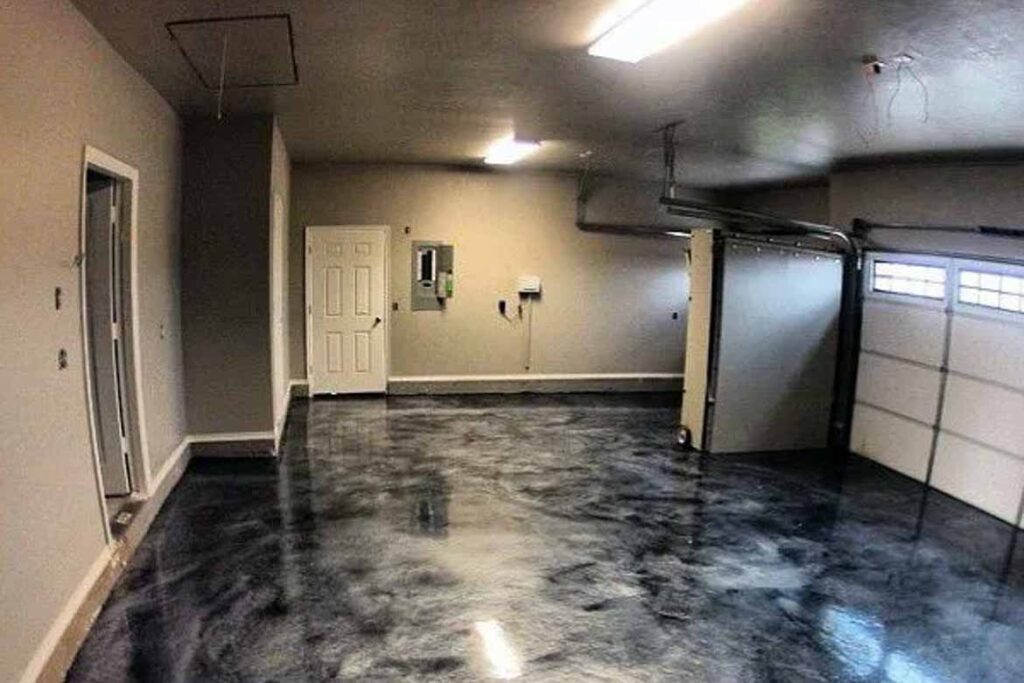
It is durable and capable of withstanding tire wear as well as out of the way, meaning there is reduced danger to the inhabitants of the home during installation.
02. Patterned Epoxy flooring
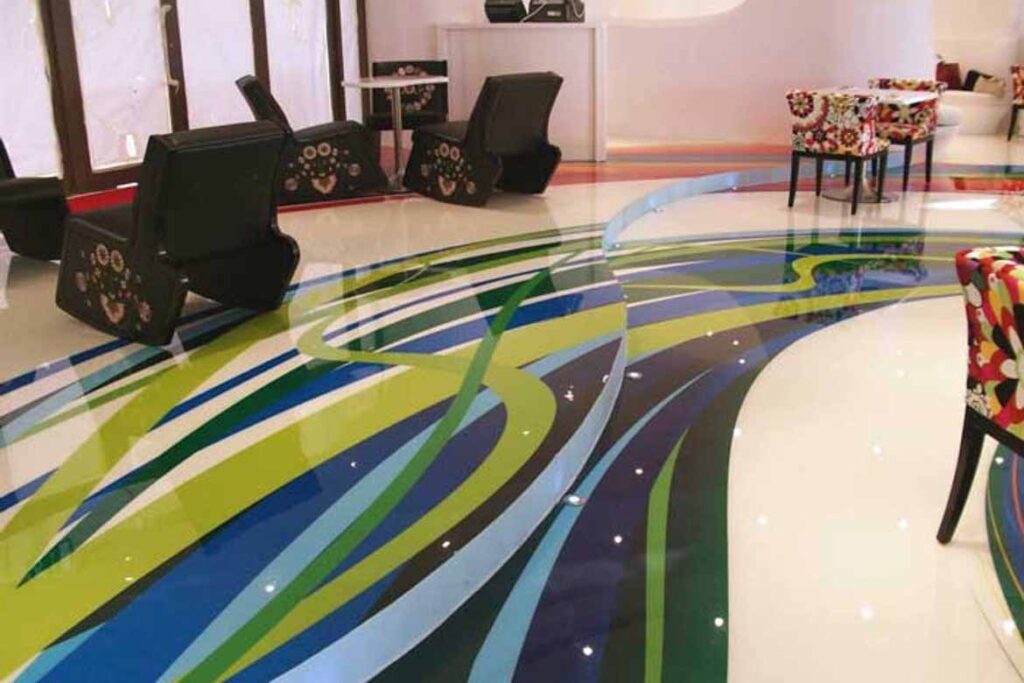
Taking advantage of the contemporary beauty of epoxy, patterned epoxy flooring is a beautiful way to create an artistic atmosphere.

You can tailor the design to the space, making it one of the broadest and most creative categories of epoxy flooring.
01. Epoxy Wood Flooring

You can apply epoxy coatings to timber floors. It will make them more durable and protect against chemicals, dust and rot – but it also can give the floors a glossy finish that make them seem clean and hygienic.

Alternatively, epoxy flooring can be made to mimic the appearance of wooden floors.
A searchable and comprehensive guide for specifying leading products and their suppliers
Keep up to date with the latest and greatest from our industry BFF's!

Sub-Zero and Wolf’s prestigious Kitchen Design Contest (KDC) has celebrated the very best in kitchen innovation and aesthetics for three decades now. Recognising premier kitchen design professionals from around the globe, the KDC facilitates innovation, style and functionality that pushes boundaries.

In the pursuit of an uplifting synergy between the inner world and the surrounding environment, internationally acclaimed Interior Architect and Designer Lorena Gaxiola transform the vibration of the auspicious number ‘8’ into mesmerising artistry alongside the Feltex design team, brought to you by GH Commercial.
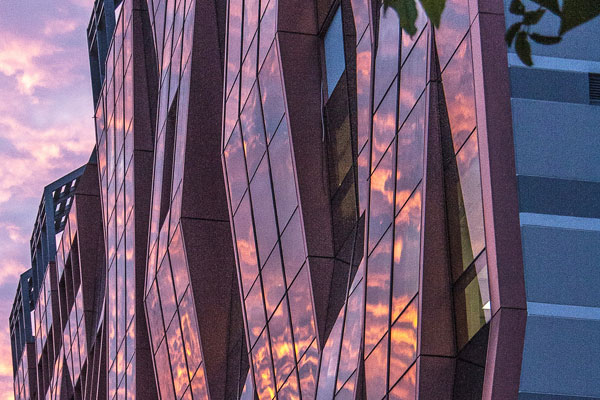
The variety of architectural styles at the sprawling Singapore General Hospital campus has widened with the completion of the new National Heart Centre building. Narelle Yabuka reports.

From the 1950s to today, British design house ercol remains as relevant in modern life as it did during the post-war years. Some of its most iconic furniture pieces have endured the turn of the century, proving that classic designs never go out of fashion.
The internet never sleeps! Here's the stuff you might have missed

Boasting unmatched cooking and food preservation capabilities, Sub-Zero and Wolf enable designers to set a new standard for kitchen design, and inspire a higher quality of culinary experience.

In Malaysia Spacemen has created a world of perfumed wonder with their latest project, Trove, where treasures abound.